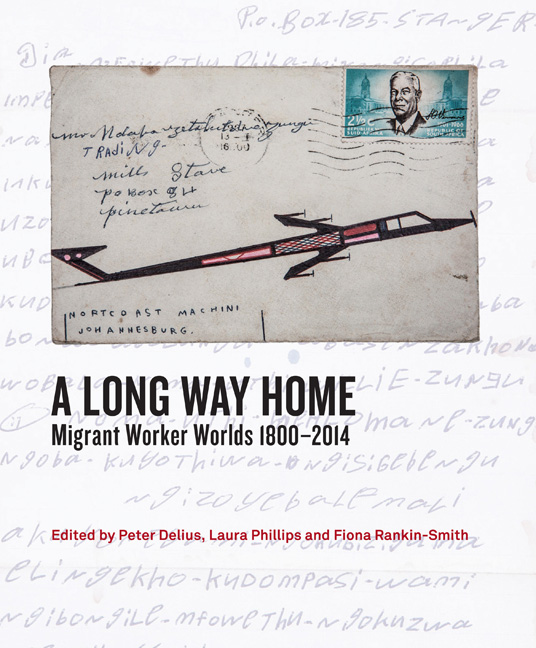Book contents
- Frontmatter
- Contents
- Acknowledgements
- Introduction: Highlighting Migrant Humanity
- Chapter 1 Ngezinyawo - Migrant Journeys
- Chapter 2 Slavery, Indenture and Migrant Labour: Maritime Immigration from Mozambique to the Cape, c.1780–1880
- Chapter 3 Walking 2 000 Kilometres to Work and Back: The Wandering Bassuto by Carl Richter
- Chapter 4 A Century of Migrancy from Mpondoland
- Chapter 5 The Migrant Kings of Zululand
- Chapter 6 The Art of Those Left Behind: Women, Beadwork and Bodies
- Chapter 7 The Illusion of Safety: Migrant Labour and Occupational Disease on South Africa's Gold Mines
- Chapter 8 ‘The Chinese Experiment’: Images from the Expansion of South Africas ‘Labour Empire’
- Chapter 9 ‘Stray Boys’: The Kruger National Park and Migrant Labour
- Chapter 10 Surviving Drought: Migrancy and the Homestead Economy
- Chapter 11 Migrants from Zebediela and Shifting Identities on the Rand, 1930s–1970s
- Chapter 12 Verwoerd's Oxen: Performing Labour Migrancy in Southern Africa
- Chapter 13 ‘Give My Regards to Everyone at Home Including Those I No Longer Remember’: The Journey of Tito Zungu's Envelopes
- Chapter 14 Sophie and the City: Womanhood, Labour and Migrancy
- Chapter 15 Bungityala
- Chapter 16 Migrants: Vanguard of the Worker's Struggles?
- Chapter 17 Debt or Savings? Of Migrants, Mines and Money
- Chapter 18 Post-Apartheid Migrancy and the Life of a Pondo Mineworker
- Notes on Contributors
- List of Figures and Tables
- Index
Chapter 14 - Sophie and the City: Womanhood, Labour and Migrancy
Published online by Cambridge University Press: 04 July 2018
- Frontmatter
- Contents
- Acknowledgements
- Introduction: Highlighting Migrant Humanity
- Chapter 1 Ngezinyawo - Migrant Journeys
- Chapter 2 Slavery, Indenture and Migrant Labour: Maritime Immigration from Mozambique to the Cape, c.1780–1880
- Chapter 3 Walking 2 000 Kilometres to Work and Back: The Wandering Bassuto by Carl Richter
- Chapter 4 A Century of Migrancy from Mpondoland
- Chapter 5 The Migrant Kings of Zululand
- Chapter 6 The Art of Those Left Behind: Women, Beadwork and Bodies
- Chapter 7 The Illusion of Safety: Migrant Labour and Occupational Disease on South Africa's Gold Mines
- Chapter 8 ‘The Chinese Experiment’: Images from the Expansion of South Africas ‘Labour Empire’
- Chapter 9 ‘Stray Boys’: The Kruger National Park and Migrant Labour
- Chapter 10 Surviving Drought: Migrancy and the Homestead Economy
- Chapter 11 Migrants from Zebediela and Shifting Identities on the Rand, 1930s–1970s
- Chapter 12 Verwoerd's Oxen: Performing Labour Migrancy in Southern Africa
- Chapter 13 ‘Give My Regards to Everyone at Home Including Those I No Longer Remember’: The Journey of Tito Zungu's Envelopes
- Chapter 14 Sophie and the City: Womanhood, Labour and Migrancy
- Chapter 15 Bungityala
- Chapter 16 Migrants: Vanguard of the Worker's Struggles?
- Chapter 17 Debt or Savings? Of Migrants, Mines and Money
- Chapter 18 Post-Apartheid Migrancy and the Life of a Pondo Mineworker
- Notes on Contributors
- List of Figures and Tables
- Index
Summary
In September and October 2011, the Johannesburg city centre was adorned with huge photographs on canvas, draped over the sides of several buildings in Newtown. In these various photographs, a black woman posed in a regal Victorian blue dress, with an apron around her waist. In one of them, she held an umbrella as a sceptre; in another, she stood at a bus stop and in another, knitted a Superman jersey. Within a few weeks, these became an accepted feature of the city landscape, prompting a Mail & Guardian journalist to interview several Johannesburg residents to find out how they understood the artworks. One woman said that she did not understand the photographs, while another, presumably a domestic worker, said she could not recognise herself in the fantastical images. She said: ‘I can see it's me. But with an umbrella? With this apron, like a person working the house? With an apron and umbrella, it's not on, no.’ This public art was part of an exhibition entitled ‘Long Live the Dead Queen’ by Mary Sibande, a young South African artist. The photographs of the domestic worker, dubbed ‘Sophie’ – a generic Anglicised name for a domestic worker – expresses pride and reimagines the figures of Sibande's foremothers (who were domestic workers) by rooting the images in what art critic Mary Corrigal called the ‘realm of fantasy, thus obviating those predictable knee jerk emotional responses which ultimately have a didactic goal and underscore the domestic workers’ role as victim’. The confusion expressed by the interviewees was reflective of the static image of the domestic worker in the minds of many South Africans, as a poor and victimised black woman, recognisable only by her working identity.
But in 2010, I met Sophie M, a woman in her late 50s who was far from the victimised generic cardboard cut-out ‘Sophie’. Born in 1952 on a farm east of Pretoria, she walked a well-travelled path in the South African imagination: forced to seek work in ‘white South Africa’, she set up an alternative semi-rural home in Hammanskraal, on the border of Bophuthatswana and Pretoria. She travelled between her rural ‘home’ and the live-in quarters of her various employers and eventually settled in Kanana, a township in Hammanskraal, although she still worked as a domestic worker once a week for a retired woman living in Pretoria.
- Type
- Chapter
- Information
- A Long Way HomeMigrant Worker Worlds 1800–2014, pp. 201 - 214Publisher: Wits University PressPrint publication year: 2014



